 Much has been made of what have been reported as poor results at BskyB (Profits announced on Friday 4 Nov 05 saw a pre-tax rise of 13.6% to £200m), intense competition is given as the cause of the lower than hoped for growth in subscribers.
Much has been made of what have been reported as poor results at BskyB (Profits announced on Friday 4 Nov 05 saw a pre-tax rise of 13.6% to £200m), intense competition is given as the cause of the lower than hoped for growth in subscribers.
The competition is attributed to the steady increase in Freeview penetration but where is the much trumpeted BBC free satellite offering, they labeled FreeSat?
Speaking recently with an NDS insider it was brought to my attention that this new ‘platform’ could be something of an empty threat. This must, of course been judged through the knowledge that NDS is the TV conditional access subscriber technology company used by Bskyb.
Even bearing this in mind, we felt it was worth asking ourselves a few questions about how it would work, who would view it and what would be its purpose:
How would it work?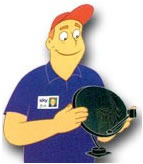 Most would consider a UK satellite rival needs to be positioned to use the same satellites as Sky services that’s Eurobird and Astra 2. If you move away from their orbital positions, you’re going to have to duplicate a whole load of services across two platforms with the expense that will entail.
Most would consider a UK satellite rival needs to be positioned to use the same satellites as Sky services that’s Eurobird and Astra 2. If you move away from their orbital positions, you’re going to have to duplicate a whole load of services across two platforms with the expense that will entail.
Who would view it?
Presumably the target audience are those who want Freeview but aren’t currently served. Freeview coverage is growing steadily and a Satellite installation is always going to be more costly than a terrestrial one, so I reckon numbers here will be limited.
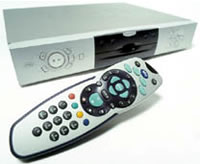 The other group that would be interested are the ‘churn’ which are now reported by Sky as around 11%. These are subscribers who are leaving their Bskyb packages – but they’re really already on the Sky Freesat as unless someone comes and takes away their Set- top-box and mini-dish. They’ll get many of the FTA (Free To Air) services like ITV3 that aren’t available on analogue terrestrial and, for a small charge, can obtain a viewing card that will allow them to view those encrypted services like Channel 5, Channel 4, ITV1 and ITV2.
The other group that would be interested are the ‘churn’ which are now reported by Sky as around 11%. These are subscribers who are leaving their Bskyb packages – but they’re really already on the Sky Freesat as unless someone comes and takes away their Set- top-box and mini-dish. They’ll get many of the FTA (Free To Air) services like ITV3 that aren’t available on analogue terrestrial and, for a small charge, can obtain a viewing card that will allow them to view those encrypted services like Channel 5, Channel 4, ITV1 and ITV2.
So what’s the purpose?
It seems to me that one purpose of the BBC floating the idea of FreeSat is as a spoiler to Bskyb. To perhaps deter those at the margin from signing up and also to increase the traditional broadcasters negotiating position when speaking to Sky.
With the promise of Satellite delivered HDTV in 2006, the continuing growth of Sky+ and the strategic takeover of Easynet, Sky still looks to know where it’s going. Given time and with the right marketing by Sky, many ‘Free-viewers’ will trade up to a Sky package that fits their requirement.
Long term, as long as Bskyb retains its hunger for subscribers, and continues to secure content that viewers wish for, I’d back it against ITV and the cable companies, with or without a new BBC sponsored Satellite version of Freeview.
 The long-awaited results from the Welsh Digital TV trial were published today.
The long-awaited results from the Welsh Digital TV trial were published today. 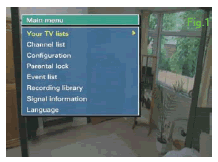 The digital signal was switched on in November 2004, running simultaneously with current analogue for three month.
The digital signal was switched on in November 2004, running simultaneously with current analogue for three month.  Transmission and Coverage – No one lost their TV service during the trial. Only three homes, which were previously in poor reception areas, could not receive the digital service and these were given a digital satellite service. Broadband was introduced during the trial and is seen as an alternative form of delivery to satellite.
Transmission and Coverage – No one lost their TV service during the trial. Only three homes, which were previously in poor reception areas, could not receive the digital service and these were given a digital satellite service. Broadband was introduced during the trial and is seen as an alternative form of delivery to satellite. 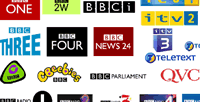 Content – Having an EPG went down well with the residents, particular when they used it to record programs on their PVR. The trialists also enthused about the ability to receive extra TV channels – after all the major benefit to consumer if the expanded choice they will be given.
Content – Having an EPG went down well with the residents, particular when they used it to record programs on their PVR. The trialists also enthused about the ability to receive extra TV channels – after all the major benefit to consumer if the expanded choice they will be given. 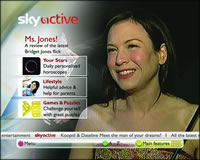 The opening page (example right) has a video background running on the right and a small number of highlighted options on the left hand side. The layout and links on this page change throughout the day, to match the audience that they think will be looking at it. Currently changing twice it will feature items like horoscopes and lifestyles links during the day and betting and dating in the evening.
The opening page (example right) has a video background running on the right and a small number of highlighted options on the left hand side. The layout and links on this page change throughout the day, to match the audience that they think will be looking at it. Currently changing twice it will feature items like horoscopes and lifestyles links during the day and betting and dating in the evening.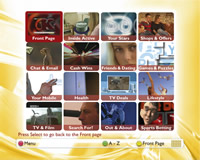 Another way to access the content is via a mosaic layout (example right). This shows a checkerboard of 16 video pieces running on loops. As the viewer uses their remote control to navigate between the videos, bring it in to focus, the audio channel associated with that video loop plays. This short-form video programming is designed to draw people in to the interactive content that lies behind and on pressing the Select key takes them to the content.
Another way to access the content is via a mosaic layout (example right). This shows a checkerboard of 16 video pieces running on loops. As the viewer uses their remote control to navigate between the videos, bring it in to focus, the audio channel associated with that video loop plays. This short-form video programming is designed to draw people in to the interactive content that lies behind and on pressing the Select key takes them to the content.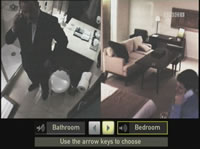 More recently the BBC has claimed to offer yet another enhanced drama first with interactive Spooks. The third series of this successful spy drama began transmission on BBC1 Monday 11 October. Unlike Family Affairs’ tentative foray into interactivity, viewers will not be voting on Spooks storylines. (If they could, they’d most certainly vote to keep Tom Quinn, the main character played by Matthew Macfadyen who exits the show in Episode 3.) Instead immediately after the programme, digital viewers are invited to find out if they have what it takes to make it as a spy. Led by Harry Pearce (a crossover character from the television series portrayed by Peter Firth), participants take a series of scored tests that examine essential espionage skills such as memory, reaction and observation. From Episode 6 viewers will be able to participate in a mission that was written by Steve Bailie, an experienced writer of television drama. “The aim,” Sophie Walpole BBC’s Head of Interactive Drama & Entertainment told us, “is to offer fans a deeper relationship with both the programme and its characters.” In addition, Walpole pointed out, “fans will get something back – they’ll get to know a little about themselves.”
More recently the BBC has claimed to offer yet another enhanced drama first with interactive Spooks. The third series of this successful spy drama began transmission on BBC1 Monday 11 October. Unlike Family Affairs’ tentative foray into interactivity, viewers will not be voting on Spooks storylines. (If they could, they’d most certainly vote to keep Tom Quinn, the main character played by Matthew Macfadyen who exits the show in Episode 3.) Instead immediately after the programme, digital viewers are invited to find out if they have what it takes to make it as a spy. Led by Harry Pearce (a crossover character from the television series portrayed by Peter Firth), participants take a series of scored tests that examine essential espionage skills such as memory, reaction and observation. From Episode 6 viewers will be able to participate in a mission that was written by Steve Bailie, an experienced writer of television drama. “The aim,” Sophie Walpole BBC’s Head of Interactive Drama & Entertainment told us, “is to offer fans a deeper relationship with both the programme and its characters.” In addition, Walpole pointed out, “fans will get something back – they’ll get to know a little about themselves.”